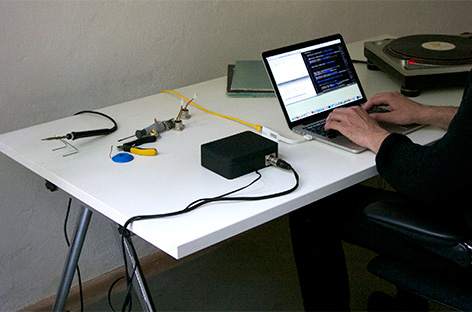Published
Mon, Jun 9, 2014, 08:50
- Aimed at helping rights organizations form a more accurate picture of what DJs are playing, the system is currently undergoing a trial at Berlin's Prince Charles.

Berlin music tech developer Future Audio Workshop is working on a system called GTI.
It stands for Geo Track ID, and at its simplest, that's just what the system does: it "fingerprints" music played in nightclubs, with the idea the data can be used by rights organizations like GEMA in Germany to more equitably distribute the fees they collect on behalf of their members. (Luis-Manuel Garcia's primer on GEMA and German nightlife provides some excellent context.)
"Until now, it has been extremely difficult for PROs [performing rights organizations] to obtain information detailing the music played in clubs," the company said in a statement. "Instead, most PROs currently employ ad-hoc methods to estimate this data, and in doing so tend to produce results that are inaccurate." In his article, Garcia describes the current method as "an extrapolation-algorithm that primarily measures mainstream market sales and 'airplay'"—in other words, not what's played in the sort of underground house and techno clubs that are being asked to pay out increasingly high fees to PROs.
GTI overcomes a number of problems, both with the logistics of accurately determining what music is played in nightclubs and on the tech side of things. The heart of the system is a box—"compact, robust, tamper-resistant, low-cost" is how Future Audio Workshop describes it—that hooks into the soundsystem and continuously analyzes the music that's played. The fingerprints are then sent to GTI, who keep "all information in a secure, encrypted database that is never put into the public domain." The fingerprinting algorithm has been designed to accommodate tracks being pitched up or down, as they would be in most DJ mixes. Much of GTI's library of fingerprints for electronic music comes from Juno, which contains vinyl-only releases in addition to its digital catalog; label owners and artists are also able to submit music to the database directly online. Future Audio Workshop say they've clocked the success rate of accurate fingerprinting at 90 percent.
When RA spoke to GTI developers Gavin Burke and Martin Gould recently, they described the product as being ready for testing outside of the lab. The first nightclub test is currently happening at Prince Charles in Berlin. Burke said the test so far has been positive, and the club is enthusiastic about the system.
"We from Prince Charles are happy to be the first ones to set up the GTI box," said Norman Methner, the club's booker and A&R rep, "and that the effort that's been put in this little box will hopefully get a more fair share of money to the people who actually produce the music that we like to listen to in our and many other clubs."